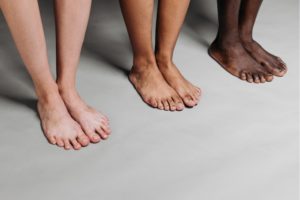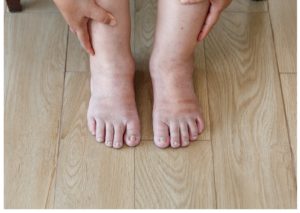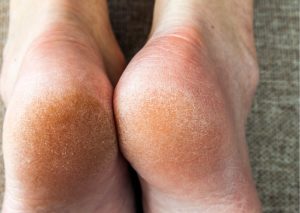Foot Health
 Your feet play a vital role in your health and wellbeing. As we age our feet may be affected by the general wear and tear of use. They can change shape and their condition may also change due to chronic health conditions.
Your feet play a vital role in your health and wellbeing. As we age our feet may be affected by the general wear and tear of use. They can change shape and their condition may also change due to chronic health conditions.
It's important to look after your feet so that they don't cause other health problems or affect other areas of your life.
Here we look at foot health issues that may be experienced as we age and what you can do to help keep your feet healthy.
Foot health webinar
Trust Medical Adviser Dr Susan Brennan hosted a webinar on Foot Care on Friday 10 March.
She was joined by beneficiary and Podiatrist Jenny Reynard discussing common foot problems, arthritis and balance issues as part of looking after our feet as we age.

Ageing feet
As we age the size and shape of our feet can change as the body’s ligaments and tendons both lose strength, and the ability to spring back. For your feet this can mean that you start to experience ‘falling’ of the foot arch which lengthens and flattens the foot and toes. When this happens it’s common to have a change in shoe size by a half size or more. This change in foot shape can cause bunions, bony protrusions or hammertoe, where a toe is pulled back and up in relation to the other toes.
Foot health issues that may develop
Osteoarthritis can develop in the foot following years of wear, tear and stress.
If you have a chronic condition you are much more likely to develop foot problems. Individuals with diabetes can suffer from the loss of sensation in the feet called diabetic neuropathy . If you are diabetic, it is particularly important to check for skin breakage on the feet as wounds can easily become infected.
If you have diabetes take a look at the Diabetes UK website for more information about caring for your feet.
Circulatory problems can affect the feet and if you are obese there is extra stress on the feet and ankles.
How can you look after your feet as you age?
Do not ignore foot pain: seek medical attention so you can be diagnosed and treated as soon as possible.
Consider using orthotics in your shoes to support falling arches and increase comfort. These can be custom made from your podiatrist or non-custom insoles.
Keep checking your feet: wounds, numbness or excessive swelling can be symptoms of conditions that require medical treatment. If in doubt, get it checked out.
 Be proactive:
Be proactive:
- Stretching for a few minutes a day can relieve foot pain.
- Losing extra weight can help reduce the stress on your feet.
- Keep your feet clean and dry, wear clean socks and wear comfortable shoes.
- Check your feet daily for cracks, blisters or sign of infection. You can use a mirror on the floor if you are not able to reach your feet.
- Keep your toenails short and straight. Nails that are badly cut can become ingrown.
- If you have a foot difference be aware of any part of your foot that can experience pressure and may require extra care.
Being proactive with your foot care can assist you in staying active as you age.
Slip-in shoes
If you're finding it difficult to put shoes on, Skechers have a 'Hands free slip-in' shoe range which are easy to put on and take off.
Take a look at their video for more information or visit their website
Further information
Find a podiatrist who is registered with the Health and Care Professions Council (HCPC)
Visit the Royal College of Podiatry website where you can find helpful resources for choosing the right footwear and foot health.
Contact us if you are concerned about your feet
Please call the Health & Wellbeing Team on 01480 474074 if you would like to speak with one of the Medical Advisers about your feet or if you would like help finding a podiatrist local to you.
